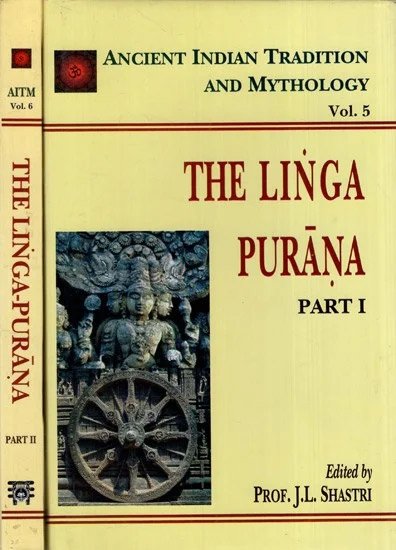The Linga Purana
by J. L. Shastri | 1951 | 265,005 words | ISBN-10: 812080340X | ISBN-13: 9788120803404
This page describes Suppression of delusion (muni-moha-shamana) which is chapter 87 of the English translation of the Linga Purana, traditionally authored by Vyasa in roughly 11,000 Sanskrit verses. It deals with Shaiva pilosophy, the Linga (symbol of Shiva), Cosmology, Yugas, Manvantaras, Creation theories, mythology, Astronomy, Yoga, Geography, Sacred pilgrimage guides (i.e., Tirthas) and Ethics. The Lingapurana is an important text in Shaivism but also contains stories on Vishnu and Brahma.
Chapter 87 - Suppression of delusion (muni-moha-śamana)
Sūta said:
1. After hearing it, those sages of great intellect Sanat and others who were frightened, bowed to the Pināka-bearing lord Parameśvara who was pleased and spoke to him thus:
2. “If it is so, O Maheśvara, how do you sport about with the goddess, the daughter of the Himavān and enjoy various pleasures. It behoves you to mention this.”
Sūta said:
3. Thus requested, the Pināka-bearing lord, Nīlalohita laughingly glanced at Ambika and spoke to those brahmins who stood by after bowing to him.
4- 5. “I am one who can adopt any body as I choose. Hence, I have neither bondage nor liberation.[1] He who is not an agent is ignorant. The jīva is Paśu (one in bondage). The all-pervading Lord is the enjoyer. Man is only an atom. He who is bound by Māyā and disallusioned [disillusioned?] is the one who is entangled in Karmans. O brahmins, the Ātman has neither knowledge nor meditation, neither bondage nor liberation.
6-7. He too who realises this in me has none of these. This Haimavatī is Vidyā[2] and I am Vedya (one who should be known). She is Prajñā (intellect). She is Śruti and Smṛti. She is Dhṛti (fortitude) stabilized by me. She is the power of knowledge, Kriyā (rite); and Icchā (will). She is Ājñā (Behest). Undoubtedly we are the two Vidyās.
8. This Prakṛti does not belong to the Jīva. Nor is she a Vikṛti on consideration. She is Māyā. She is not a Vikāra (effect). She is devoid of clarity of ‘Sat’ and ‘Asat’.
9. Formerly she originated from my mouth at my behest. She is the eternal deity of five faces. She is the highly blessed and bestows fearlessness on the worlds.
10- 11. After entering her the Ājñā (behest), I think about the welfare of the worlds. I am Śiva. I pervade all along with her in twenty-seven[3] forms. O excellent brahmins since then begins the work for salvation.”
Sūta said:
After saying thus, Parameśvara looked at Bhavānī.
12- 13. On seeing him, the unchanging Bhavānī removed the Māyā. Rid of the impurities of Māyā those sages looked at Pārvatī, became pleased and were liberated. Hence she is the greatest goat In fact, there is no difference at all between Umā and Śaṅkara.[4]
14-17. There is no doubt that he is stationed after adopting the two forms. When there is a contact with Vijnana (perfect knowledge) at the behest of Parameṣṭhin, liberation occurs within a moment and not otherwise, even with crores of holy rites. Here the order intended for the living beings is not applicable. By the grace of Parameṣṭhin liberation takes place in a trice. This is undoubtedly the vow of the lord. The creature (i.e. individual soul) is liberated, thanks to the grace of Parameṣṭhin even when he is in the womb or when he is born, or when he is a boy, a young man or an old man. By the grace of the lord of Devas every living being is liberated whether it is oviparous or a plant or one born of sweat. No doubt need be entertained in this regard.
18-22a. He alone is the lord of the worlds; Śiva is the cause of bondage and liberation. The worlds viz:—Bhūḥ, Bhuvaḥ, Svaḥ, Mahaḥ, Jana, Tapas and Satya the innumerable Cosmic Eggs as well as the eight[5] coverings of the Cosmic Egg constitute the body of the lord. Mobile and immobile beings who reside in the seven continents, on the mountains, in the forests and oceans, and in the layers of winds and in other worlds also are born from the parts of the lord. Indeed, he alone is the goal unto them all.
22b-25. Rudra is all. Obeisance unto the noble-souled Puruṣa. This universe, all living beings are born of Rudra. This goddess Ambikā is the Ājñā (behest) of Rudra. Salvation is effected through Her.
Thus, the Siddhas, the heaven-walkers proclaimed with delighted minds.
When the lord stands by and glances at them gracefully along with Ambika the heaven-walkers attain identity with the lord.
Footnotes and references:
[1]:
[2]:
eṣā vidyā—this Umā is identical with knowledge or with Primor
[3]:
dial nature in association with Puruṣa.
[4]:
In fact Prakṛti and Puruṣa are identical.
[5]:
See p. 4 note 13, p. 11. note 18.
